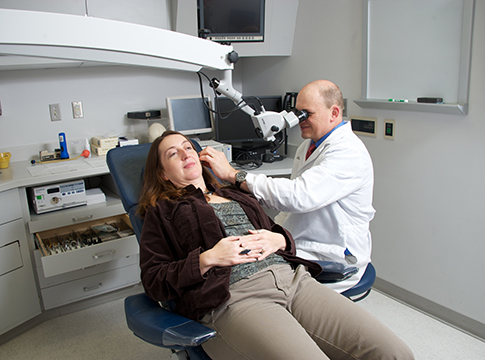ENT Surgical Interventions Options for Sleep Apnea: What to Expect
Wiki Article
Checking out the Field of Otolaryngology: What to Expect When You Consult an ENT
Otolaryngology, commonly described as ENT, includes the medical diagnosis and treatment of throat, nose, and ear problems. For those experiencing relevant issues, speaking with an ENT professional can provide clarity and relief. Comprehending what to expect throughout such consultations is necessary for effective communication and care. This review will certainly lay out key elements of the ENT experience, including typical factors for sees and the processes entailed in medical diagnosis and treatment.
Understanding Otolaryngology: An Overview
Otolaryngology, typically described as ENT (Throat, ear, and nose) medicine, is a specialized branch of medicine that focuses on the medical diagnosis and therapy of conditions impacting these critical locations of the human body. This area incorporates a wide range of conditions, including those related to hearing, balance, respiratory function, and speech. Otolaryngologists are educated to take care of both surgical and medical therapies, utilizing innovative techniques and technologies. Their know-how prolongs beyond standard conditions, attending to concerns such as allergic reactions, sinus infections, and hearing loss. Furthermore, they play an essential duty in the monitoring of head and neck cancers, offering extensive care customized to specific client needs. Overall, otolaryngology remains essential for keeping health and wellness and lifestyle in affected individuals.Usual Reasons to See an ENT Professional
Many individuals look for the know-how of an ENT expert for a variety of reasons, showing the diverse nature of conditions that impact the nose, ear, and throat. Usual concerns consist of chronic sinusitis, which often results in relentless nasal congestion and facial discomfort. Allergies and their associated symptoms, such as itching and sneezing, also trigger brows through to these professionals (Otolaryngologist). Hearing loss, whether unexpected or steady, is one more substantial reason for examination. Additionally, people may seek examination for throat problems, including persistent hoarseness or swallowing difficulties. Sleep apnea, characterized by interrupted breathing during sleep, is frequently dealt with by ENT professionals. Each of these conditions highlights the relevance of specialized care in managing intricate ENT-related wellness issues
Planning for Your ENT Appointment
When planning for an ENT visit, it is vital to collect relevant info and consider any kind of specific concerns. Individuals ought to assemble an in-depth case history, including previous ear, nose, or throat problems, surgeries, and existing medications. Recording symptoms-- such as regularity, severity, and period-- can provide useful understandings for the ENT professional. In addition, individuals must prepare a checklist of concerns they want to ask, guaranteeing that all problems are dealt with throughout the go to. Bringing along any kind of relevant medical records or examination outcomes can further help the ENT in recognizing the patient's problem. Finally, people must verify their consultation details, consisting of time, date, and area, to reduce any type of final confusion. Proper preparation can boost the efficiency of the appointment and lead to better end results.What to Anticipate Throughout the Appointment
As the consultation begins, the patient can anticipate to take part in a comprehensive conversation with the ENT expert concerning their signs and symptoms and case history. The professional will make inquiries concerning the duration, regularity, and intensity of signs and symptoms such as hearing loss, nasal congestion, or aching throat. In addition, the client's previous clinical problems, medications, and any appropriate family background will certainly be assessed, assisting the specialist in developing a total understanding of the client's wellness. The ENT may likewise inquire about lifestyle variables, such as exposure to irritants or allergens. This open dialogue establishes a foundation for the assessment, guaranteeing that the individual's issues are dealt with and establishing the phase for any kind of essential assessments or recommendations for therapy.
Analysis Examinations and Treatments in Otolaryngology
A variety of diagnostic tests and treatments are important in otolaryngology to properly review and identify conditions impacting the throat, nose, and ear. Typical examinations include audiometry, which gauges hearing function, and tympanometry, evaluating middle ear stress. Nasal endoscopy enables visualization of the nasal flows and sinuses, while laryngoscopy analyzes the throat and have a peek at this website singing cables. Imaging strategies, such as CT scans and MRIs, offer in-depth views of head and neck frameworks. Allergic reaction testing may also be carried out to recognize triggers for sinus or respiratory system problems. These diagnostic tools make it possible for ENT experts to establish an extensive understanding of people' problems, making certain tailored and effective administration plans. Appropriate medical diagnosis is necessary for effective therapy results in otolaryngology.Therapy Options Provided by ENT Specialists
ENT specialists offer a selection of therapy alternatives tailored to address details conditions influencing the nose, throat, and ear. These treatments vary from conservative techniques, such as medicine and way of living alterations, to more invasive treatments. For circumstances, allergic reactions may be taken care of with antihistamines or immunotherapy, while chronic sinusitis could call for nasal corticosteroids or sinus surgical procedure. For hearing loss, ENT professionals frequently suggest listening device or surgical interventions like cochlear implants. In situations of throat disorders, options can consist of speech treatment or surgical procedures to remove obstructions. In addition, they may provide guidance for handling rest apnea, consisting of using CPAP tools or surgical interventions. you can find out more On the whole, the objective is to enhance people' lifestyle via individualized treatment and reliable therapy approaches.When to Look For Follow-Up Treatment With an ENT
Acknowledging when to look for follow-up treatment with an ENT expert is crucial for managing continuous symptoms or complications connected to ear, nose, and throat conditions. People need to think about scheduling a follow-up visit if signs persist despite preliminary therapy, such as chronic ear pain, nasal congestion, or throat pain. Modifications in hearing, equilibrium issues, or uncommon nasal discharge may likewise warrant further assessment. Additionally, if an individual experiences adverse effects from suggested medications or has gone through a procedure, follow-up treatment is crucial to keep track of recovery and deal with any type of problems. Prompt appointments can guarantee efficient monitoring of problems, prevent prospective issues, and supply assurance concerning one's health and wellness. Looking for follow-up treatment promotes proactive health and wellness administration in otolaryngology.Frequently Asked Inquiries

What Certifications Should I Search for in an ENT Professional?
When looking for an ENT professional, one need to try to find board certification, relevant experience, and solid client reviews. Additionally, efficient interaction abilities and a compassionate approach can greatly improve the overall treatment experience.Exactly how Do I Select the Right ENT for My Needs?
Picking the right ENT specialist includes examining their credentials, experience, and client reviews (ENT Clinic). It is vital to contemplate their communication design and method to therapy, guaranteeing they straighten with the person's particular health and wellness demands and preferencesExist Any Kind Of Threats Connected With ENT Procedures?
The dangers connected with ENT treatments may consist of infection, blood loss, anesthetic complications, discover this info here and potential damages to bordering frameworks. Patients must discuss these threats with their doctor to comprehend individual issues and guarantee educated choices.Exactly How Can I Handle Anxiety Before My ENT Consultation?
To handle anxiousness before a visit, people can exercise deep breathing exercises, envision positive outcomes, prepare inquiries beforehand, and seek assistance from pals or family members, fostering a sense of peace of mind and peace.What Should I Do if I Experience Negative Effects From Therapy?
The individual needs to without delay report them to their health care provider if side impacts from treatment take place. Changes to therapy or extra treatments may be required to ensure safety and performance in managing their problem - Otolaryngology. As the consultation starts, the person can anticipate to engage in a comprehensive conversation with the ENT professional regarding their symptoms and clinical history. These analysis tools enable ENT professionals to create a comprehensive understanding of patients' problems, ensuring customized and reliable monitoring plans. ENT specialists supply a selection of treatment options customized to attend to specific problems affecting the nose, ear, and throat. When seeking an ENT professional, one need to look for board qualification, appropriate experience, and strong individual evaluations. Picking the appropriate ENT professional involves reviewing their certifications, experience, and patient testimonialsReport this wiki page